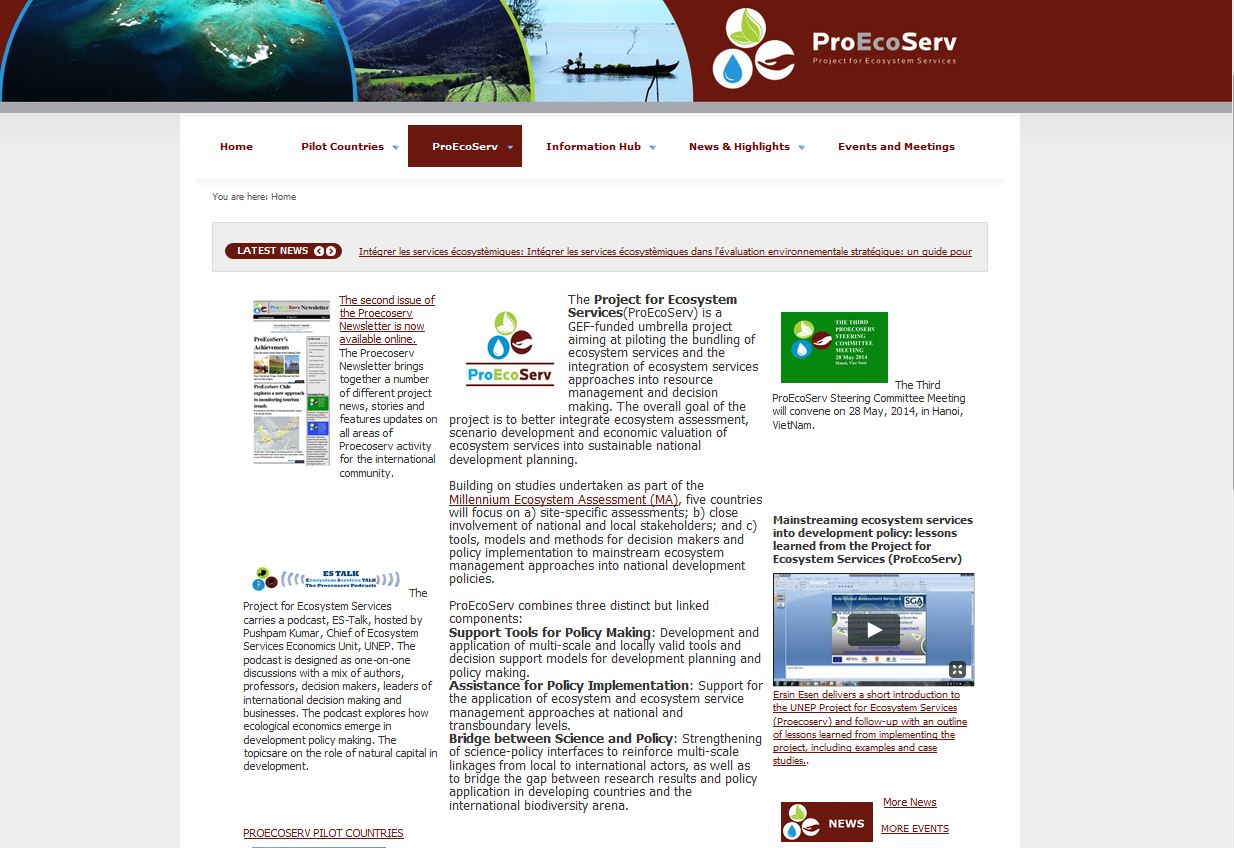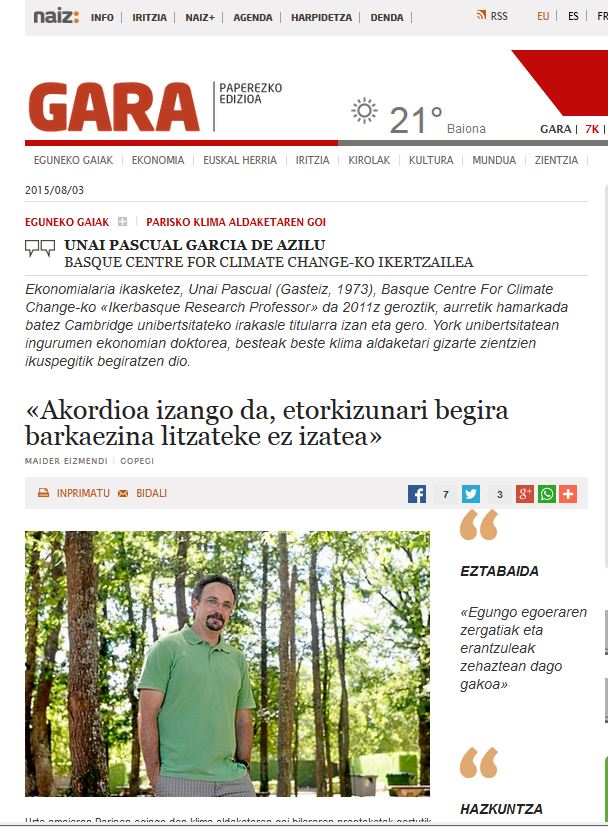- Inicio
- Prensa
A partir de Enero de 2016 todas las Noticias de BC3 estarán disponibles en news.bc3research.org.
Las Noticias anteriores a Enero 2016 se muestrran a continuación
Prensa
Nota de Prensa_BC3_Nueva Dirección BC3_21012016
Thursday, 21 de January de 2016
Nueva Dirección Científica en BC3 para desarrollar la era Post-Paris
• La Prof. Maria Jose Sanz recibe del anterior Director Científico, el Prof. Anil Markandya el liderazgo del centro BC3-Basque Centre for Climate Change, referencia mundial de Think Tanks de economía y política del cambio climático.
• Tras la Cumbre COP21 de Paris, la comunidad científica afronta uno de los mayores desafíos del ser humano, dado que. Entender y luchar contra el cambio climático ocupa las más altas prioridades en agendas políticas y sociales en todo el mundo.
[Bilbao, 21 de Enero de 2016] La Prof. Maria Jose Sanz (Valencia, 1963) ha comenzado ya a desarrollar su labor en la Dirección Científica en BC3 (Basque Centre for Climate Change), tras la despedida en diciembre del pasado año del Prof. Anil Markandya, quien ha dirigido el centro desde su creación en 2008. La nueva directora científica estará al frente del equipo de BC3 formado en la actualidad por 40 profesionales de un total de 11 nacionalidades y de la máxima cualificación científica y profesional.
Descargar nota completa:NP_BC3_Nueva Dirección Científica_21012016
Press Release_BC3_COP21_Regions and Climate Change_20151210
Thursday, 10 de December de 2015
CLIMATE CHANGE:
BASQUE AND THREE ITALIAN REGIONS LEADING ACTORS AT COP21
A Side- Event organized in the framework of UNFCCC, brought together representatives from Regional Authorities and climate change scientists, proposing successful examples that can be expanded to other regional contexts. The Italian Sardinia, Apulia and Lazio, jointly with the Basque region, key players in an international meeting at COP21 in Paris.
[Paris, 10th of December 2015]
Paris - In the challenge to address climate change, regions play an essential role in addition to the decisions taken by national governments and international organizations...
Read more, Download
Nota de Prensa_BC3_Klimagune_ 20151120
Friday, 20 de November de 2015
COMUNICAR EL CAMBIO CLIMÁTICO: DESAFÍO CIENTÍFICO Y SOCIAL
Klimagune 2015, la comunicación de la ciencia del cambio climático, a debate en la antesala de la COP21
- Este lunes 23 de noviembre, se celebra en Bilbao la sexta edición de Klimagune, el foro para el debate científico sobre el Cambio Climático.
- La cita de este año analizará el papel de la ciencia en la información sobre el Cambio Climático, y contará con sendos debates protagonizados por profesionales de la ciencia y de los medios de comunicación.
- Organizado por BC3, Basque Centre for Climate Change y UPV/EHU, contará con la participación de un centenar de expertos.
[Bilbao, 20 de noviembre de 2015]
El día 30 de noviembre arranca en Paris la XXI Conferencia Internacional sobre el Cambio Climático. Durante 11 días, la agenda informativa mundial centrará su atención en los informes científicos y en las decisiones políticas que los estados participantes puedan acordar para conseguir una reducción de la emisión de los gases de efecto invernadero. ¿Está garantizada la veracidad científica de esta información? ¿Cómo construyen sus noticias los medios? ¿Cómo comunican sus evidencias los científicos? Estas son algunas de las preguntas que se plantean en la sexta edición del encuentro Klimagune, que se celebra este lunes en el Bizkaia Aretoa de Bilbao, organizado por BC3 (Basque Centre for Climate Change) y UPV/EHU…
Acceder a la Nota de Prensa:
Nota de prensa bc3 kllimagune 20151120
Persona contacto BC3
Ainhoa
Azkarate ainhoa.azkarate@bc3research.org
Teléfono: 94-4014690
Prentsa Oharra_BC3_KLIMAGUNE_20151120
Friday, 20 de November de 2015
KLIMA-ALDAKETAREN KOMUNIKAZIOA: ZIENTZIA ETA GIZARTE ERRONKA
Klimagune 2015, klima-aldaketaren komunikazioa eztabaidagai COP21 delakoaren bezperatan
Ø Astelehenean, hilak 23, Bilbon izango da Klimagune, klima-aldaketaren inguruko eztabaida zientifikorako topaketaren seigarren edizioa
Ø Aurten zientziak Klima-Aldaketaren informazioan betetzen duen zeregina aztertuko da, eta eztabaidan jardungo dute komunitate zientifikoko eta hedabideetako profesionalak
Ø BC3, Basque Centre for Climate Change, eta EHU dira topaketaren antolatzaileak, eta ehun bat adituk parte hartuko dute
[Bilbo, 2015eko azaroak 20]
Azaroaren 30an abiatuko da Parisen XXI. Klima-Aldaketari buruzko Nazioarteko Konferentzia. Hamaika egunez, mundu osoko agenda informatiboan zientzialarien txostenak eta berotegi-gasen murrizketaz estatu parte hartzaileek ados ditzaketen erabakiak azalduko dira noiznahi. Zientifikoki zuzena da informazio hori? Nola sortzen dituzte albisteak hedabideek? Nola komunikatzen dituzte beren ebidentziak zientzialariek? Hauexek dira Klimagune-ren seigarren edizioan erantzuten saiatuko diren galderetako batzuk. Bilbon izango da, Bizkaia Aretoan, astelehen honetan (hilak 23), BC3-k (Basque Centre for Climate Change) eta EHUk- antolatuta...
Prentsa Oharra eskuragarri hemen
Press Release_BC3_TRANSRISK_20151005
Monday, 05 de October de 2015
BC3 participates in a large EU-funded project to facilitate the transition to a low carbon society
[Bilbao, 5th of October2015] The new EU project, TRANSrisk, celebrated its kick-off meeting in Brussels recently. TRANSrisk (Transitions pathways and risk analysis for climate change mitigation and adaptation strategies) has received funding of €7.4 million from the European Commission under the Societal Challenges pillar of the Horizon 2020 program, and BC3 is one of the main partners of this consortium.
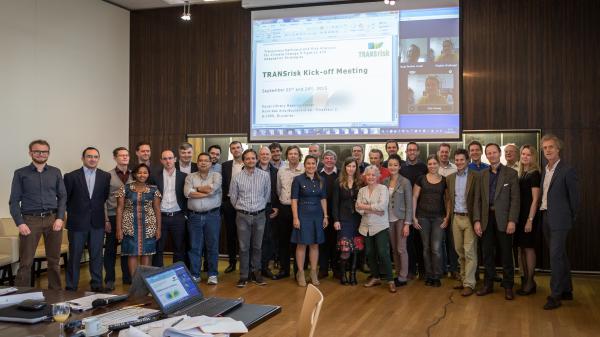
The EU has adopted ambitious policy goals for the transition to a low carbon society by 2050. A detailed roadmap published in 2011 suggests that the EU should cut its emissions to 80% below 1990 levels through domestic reductions alone by 2050, with a cut of 40% in the next 15 years. If these goals are to be met, fundamental transformations to energy generation and demand are required.
Currently, ways of analysing and assessing climate evolution, impacts, and mitigation options are faced with a high degree of uncertainty. TRANSrisk will create a framework in which risks and uncertainties are integral to the assessment of how climate change mitigation affects the overall economic, social and environmental well-being of society in the EU, emerging countries, and at the broader global level. It will also assess the interlinkages between climate change and other dimensions of sustainable development. One of the innovative aspects of TRANSrisk is that multiple stakeholders will be engaged in the entire research process so the public acceptability of the different low carbon options can be addressed, directly helping those who have to finally implement the policies or deal with their consequences.
TRANSrisk involves 12 partner organisations. Dr. Mikel Gonzalez-Eguino, the Principal Investigator at BC3, said: "I'm delighted that BC3 will be one of the main partners on this large EU-funded project with partners across Europe, Africa, Asia and Latin America. We want to help with our research to move as quickly as possible towards a low carbon society and to avoid the worst consequences of climate change. BC3 will contribute to this project by assessing the synergies and conflicts associated to different types of solutions, so that policy makers can take better informed decisions”.
Prentsa Oharra_BC3_TRANSRISK_20151005
Monday, 05 de October de 2015
BC3k karbono gutxiko gizarte batera igarotzeko eta EBk finantzatutako proiektu handi batean parte hartzen du
[Bilbo, 2015ko Urriak 5] EBren TRANSrisk proiektu berriak aurreneko egunotan egin zuen lehenengo bilera Bruselan. Proiektuak (Transitions pathways and risk analysis for climate change mitigation and adaptation strategies/Trantsizio-bideak eta arrisku-azterketa klima-aldaketa geldiarazteko eta egokitzeko estrategietarako) 7,4 milioi euroko finantzaketa jaso du Europako Batzordetik Horizonte 2020 programako Gizarte Erronkak zutabearen testuinguruan, eta BC3 partzuergo horretako kide nagusietako bat da.

EBk helburu politiko handinahikoak ezarri ditu 2050ean karbono gutxiko gizarte batera igarotzeko. Bide-orri xehatua 2011n argitaratu zen, eta bertan adierazten da EBk % 80 murriztu beharko lituzkeela bere emisioak 1990eko mailetatik 2050erako etxeetarako ezarritako murrizketen bidez bakarrik, eta, ondoren, beste % 40 datozen 15 urteotan. Helburu horiek bete ahal izateko oinarrizko aldaketak egin behar dira energiaren eskaeran eta sorkuntzan. Inpaktuak, aldaketa geldiarazteko aukerak eta klimaren bilakaera aztertu eta ebaluatzeko metodoek une hauetan erabateko ziurgabetasuna adierazten dute. TRANSrisk proiektuak sortuko duen esparruaren baitan arriskuak eta ziurgabetasunak oinarrizko osagaia izango dira klima-aldaketak EBko, garatze bidean dauden herrialdeetako eta munduko gainerako tokietako ekonomiaren, gizartearen eta ingurumenaren ongizatean duen eragina geldiarazteko modua aurkitzeko ebaluazioan. Klima-aldaketaren eta garapen iraunkorraren beste dimentsio batzuen arteko loturak ere ebaluatuko dira bertan. TRANSrisk proiektuaren berrikuntzetako bat izango da eragile askok hartuko dutela parte ikerketa-prozesuan karbono gutxiko aukera ezberdinen onargarritasun publikoa aztertu ahal izateko, eta hori laguntza zuzena izango da azkenean politikak ezarri beharko dituzten edo horien ondorioak aztertu beharko dituzten arduradunentzat.
TRANSrisk proiektuan hamabi erakundek hartzen dute parte. Mikel González-Eguino doktoreak, BC3ko ikerlari nagusiak, honako hau esan du: “Gustura nago BC3 EBk finantzatutako proiektu handi honetako partaide nagusietako bat delako, eta kontuan izan behar da Europako, Afrikako, Asiako eta Latinoamerikako partaideak ere badirela. Gure ikerketaren bidez karbono gutxiko gizarte batera ahalik eta azkarren iristen lagundu nahi dugu, eta, aldi berean, klima-aldaketaren ondoriorik okerrenak saihestu nahi ditugu. Arduradun politikoek hobeto funtsatutako erabakiak hartu ahal izateko era ezberdinetako irtenbideekin zerikusia duten arazoen eta sinergien ebaluazioa izango da BC3k proiektu honi egingo dion ekarpena”.
Nota de Prensa_BC3_TRANSRISK_05102015
Monday, 05 de October de 2015
BC3 participa en un gran proyecto financiado por la UE para facilitar la transición a una sociedad baja en carbono
El nuevo proyecto de la UE, TRANSrisk, ha celebrado recientemente su reunión inicial en Bruselas. TRANSrisk (Transitions pathways and risk analysis for climate change mitigation and adaptation strategies/Rutas de transición y análisis de riesgos para las estrategias de adaptación y contención del cambio climático) ha recibido una financiación de 7,4 millones de euros de la Comisión Europea en el contexto del pilar Desafíos Sociales del programa Horizonte 2020, y BC3 es uno de los principales socios de este consorcio.

La UE ha fijado ambiciosos objetivos políticos para la transición hacia una sociedad baja en carbono en 2050. Una hoja de ruta detallada que se publicó en 2011 sugiere que la UE debería reducir sus emisiones a un 80% por debajo de los niveles de 1990 únicamente mediante las reducciones domésticas para 2050, así como reducirlas un 40% en los próximos 15 años. Para cumplir estos objetivos, se requieren transformaciones fundamentales en la demanda y generación energéticas.
Actualmente, los métodos de análisis y evaluación de la evolución climática, los impactos y las opciones de contención presentan una elevada incertidumbre. TRANSrisk creará un marco en el que los riesgos y las incertidumbres formen parte esencial de la evaluación de cómo la contención del cambio climático afecta al bienestar económico, social y medioambiental de la sociedad en la UE, en los países emergentes y en el resto del mundo. Además, evaluará las interconexiones entre el cambio climático y otras dimensiones del desarrollo sostenible. Uno de los aspectos innovaciones de TRANSrisk es que participarán múltiples actores en todo el proceso de investigación para poder abordar la aceptabilidad pública de diferentes opciones bajas en carbono, lo cual ayudará directamente a los responsables que deben aplicar finalmente las políticas o tratar sus consecuencias.
En TRANSrisk, participan doce organizaciones. El Dr. Mikel González-Eguino, Investigador Principal de BC3, ha comentado lo siguiente: “Me complace que BC3 sea uno de los participantes principales de este gran proyecto financiado por la UE, en el que también están presentes socios de Europa, África, Asia y Latinoamérica. Con nuestra investigación, queremos contribuir a avanzar lo más rápido posible hacia una sociedad baja en carbono y evitar las peores consecuencias del cambio climático. BC3 aportará a este proyecto la evaluación de las sinergias y conflictos asociados a diferentes tipos de soluciones para que los responsables políticos tomen decisiones más fundadas”.
"Kostaldeari begira, eta metroa eskura" Berria Egunkaria
Monday, 05 de October de 2015
Klima aldaketak XXI. mendean euskal kostaldean izango duen eragina aztertu dute hainbat adituk, besteak beste BC3, Basque Centre for Climate Change ko ikerlaria den Elisa Sainz de Murietak .
Beren ikerketen emaitzak Uhinak kongresuan aurkeztuko dituzte, asteon, Irunen
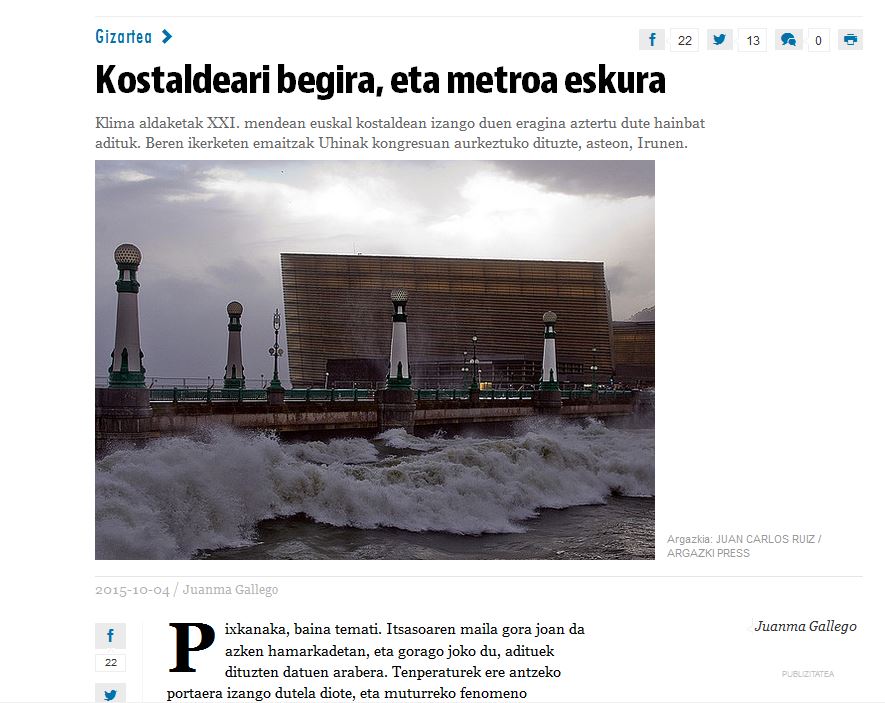
Irakurri berri oso hemen (Iturria Berria Egunkaria)
Prof. Markandya endorsed the Economists’ Declaration on Universal Health Coverage
Friday, 25 de September de 2015
Prof. Anil Markandya , Scientific Director of BC3, Basque Centre for Climate Change, is among the 267 experts in 44 countries who have made a declaration at the Lancet that universal health coverage is a smart, affordable investment to save millions of lives, protect livelihoods and strengthen economies.
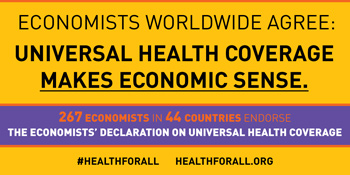
Universal health coverage means ensuring that everyone can obtain essential health services at high quality without suffering financial hardship.
Published in the Lancet , scientific journal (http://www.thelancet.com/pdfs/journals/lancet/PIIS0140-6736%2815%2900242-1.pdf ) ahead of the United Nations Sustainable Development Summit 2015 https://sustainabledevelopment.un.org/post2015/summit the experts say this is a crucial moment for global leaders to reflect on financial investments to maximise progress by 2030.
The declaration was made by economists on every continent, five Nobel Laureates, current and former Chief Economists of the World Bank and leading experts in health and development economics.The signatories urged that;
- Heads of government increase domestic funds for global health
convergence and provide vocal political leadership to implement policy
reforms toward pro-poor universal health coverage;
- Donor countries meet their pledges for international development assistance and commit to investing in the global functions of development assistance for health, particularly research and development for diseases of poverty;
- Development financing discussions explicitly address equity, including who pays domestically and who benefits;
- National policymakers embrace universal health coverage, as defined above, as an integrated approach for measuring progress toward health targets in the post-2015 global development framework.
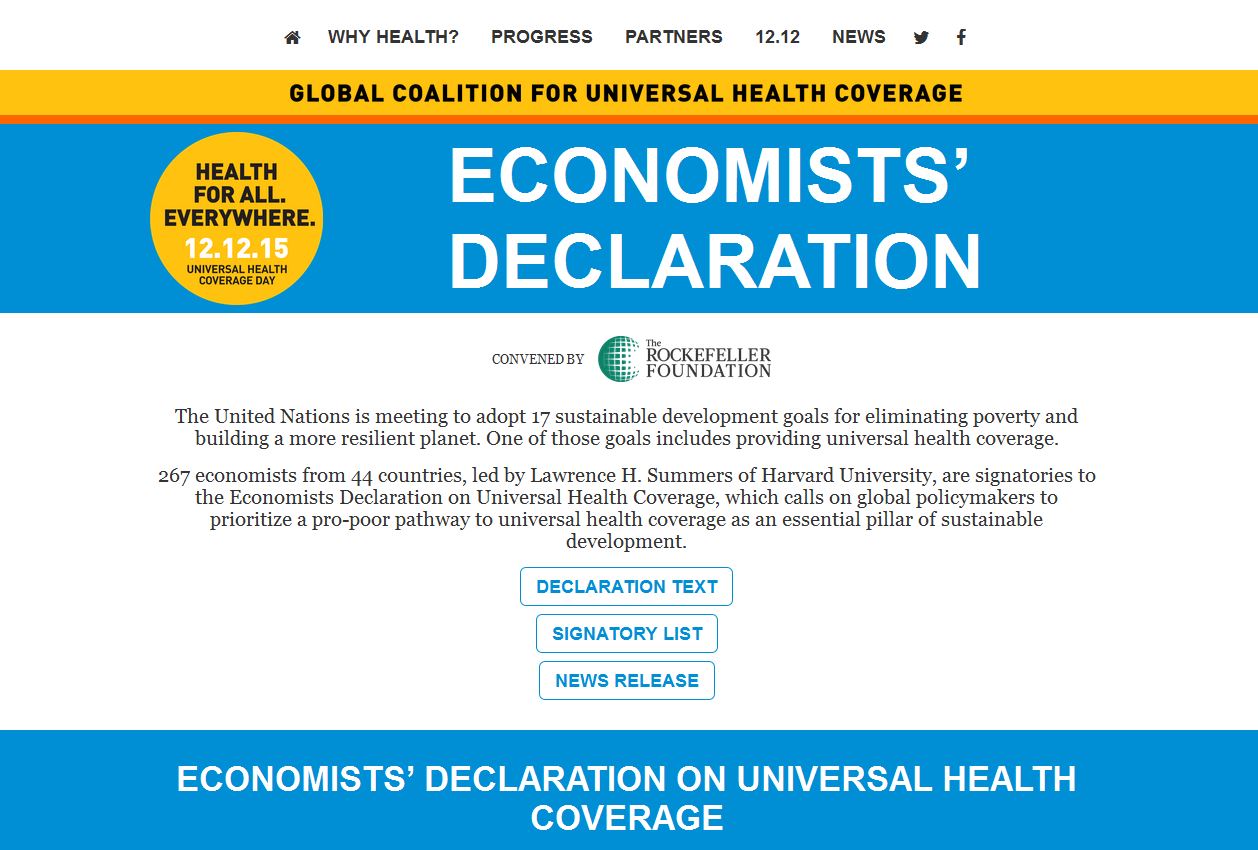
http://universalhealthcoverageday.org/economists-declaration/
With the United Nations set to launch the bold sustainable development agenda (25-27 Sept) , this is a crucial moment for global leaders to reflect on the financial investments needed to maximize progress by 2030. As an input into deliberations around those investments, the signatories to this declaration, 267 economists from 44 countries, call on global policymakers to prioritize a pro-poor pathway to universal health coverage as an essential pillar of development.
Universal health coverage means ensuring that everyone can obtain essential health services at high quality without suffering financial hardship. Resource constraints require individual countries to determine their own definition of “essential” – while recognizing, in the words of former World Health Organization Director-General Gro Harlem Brundtland, that “... if services are to be provided for all, not all services can be provided. The most cost-effective services should be provided first.”
Even granted this recognition of resource constraints, our generation has a historic opportunity to achieve a “grand convergence” in global health, reducing preventable maternal, child, and infectious disease deaths to universally low levels by 2035. In its report, Global Health 2035, the Lancet Commission on Investing in Health showed that with today’s powerful tools for improving health, and the prospect for continued improvement in those tools, financially feasible universal health coverage in every country could lead to grand convergence with its accompanying benefits in both health and in protection from health-related financial risks. (1)
We amplify these points below.
Our global society has a vested interest in investing in health to transform lives and livelihoods.
• Health is essential to eradicating extreme poverty and promoting growth of well-being. (2,3) Over the past decade, health improvements – measured by the value of life-years gained – constituted 24% of full income growth in low- and middle-income countries. (1)
• Health systems oriented toward universal health coverage, immensely valuable in their own right, produce an array of benefits: in times of crisis, they mitigate the impact of shocks on communities; in times of calm, they foster more cohesive societies and productive economies.
• The economic benefits of investment in grand convergence are estimated to be more than 10 times greater than costs – meaning that early stages on the pathway to universal health coverage, focused on high-payoff convergence interventions, will have high value relative to the cost of raising revenue, including the deadweight (or welfare) cost of taxation, or (in most cases) to the value of its use in other sectors. (4)
The success of the next development chapter hinges on the ability to actually deliver proven health solutions to the poorest and most marginalized populations.
• There is a strong record of public sector and development assistance success in the finance and delivery of transformative health interventions – immunizations, treatment of HIV/AIDS, tuberculosis and childhood infections, and eradication or near eradication of major communicable diseases. At the same time most countries have experienced difficulties with delivering primary and secondary care in both the public and private sectors. Continued progress toward universal health coverage will require addressing these delivery problems.
• 150 million people fall into poverty every year paying for health out-of-pocket. (5) By pooling funding and providing early access to health services, universal health coverage reduces reliance on out-of-pocket payments, thereby protecting households from impoverishing financial risks.
• The Ebola virus disease epidemic has reminded us that we are only as strong as our weakest links. The debilitating effect of Ebola could have been mitigated by building up public health systems in Guinea, Liberia and Sierra Leone at one third the cost of the Ebola response so far. (6)
Every country has the opportunity to achieve universal health coverage.
• More than 100 countries across the development spectrum have begun working toward universal health coverage – testing and increasingly demonstrating its feasibility.
• Countries will find greatest value for money by financing for everyone convergence-related services that are high-quality and free or low cost at the point of delivery. As their domestic resources increase, countries would expand the package of essential services that are publicly financed for all.
• Most countries have the capacity to raise more domestic funds for health through improved tax systems and innovative financing mechanisms. And given anticipated economic growth across low- and lower-middle-income counties, most countries will have additional financial means to invest more in health services and delivery. When allocated efficiently, greater investments in health can result in lower overall costs to the system. (1)
Development assistance for health will play an essential part in achievement of a grand convergence in global health and universal health coverage.
• Domestic funding alone will not be enough for many low-income countries to provide even the convergence-related health services. Focusing the available country-specific health aid on the convergence interventions in low-income (but committed) countries can provide invaluable help.
• A grand convergence in global health will be greatly helped by substantial investments from donors in the neglected global functions of development assistance for health: providing global public goods such as health research and development, dealing with cross-border externalities such as pandemics and antimicrobial resistance, and supporting leadership and stewardship of global institutions. Adequate finance of these global functions is likely to prove the most efficient path to improving conditions of the poor in middle-income countries. (7)
We, the undersigned, therefore urge that:
• Heads of government increase domestic funds for global health convergence and provide vocal political leadership to implement policy reforms toward pro-poor universal health coverage;
• Donor countries meet their pledges for international development assistance and commit to investing in the global functions of development assistance for health, particularly research and development for diseases of poverty;
• Development financing discussions explicitly address equity, including who pays domestically and who benefits;
• National policymakers embrace universal health coverage, as defined above, as an integrated approach for measuring progress toward health targets in the post-2015 global development framework.
• • •
Even with substantial rates of economic growth, resources for health (and other sectors) will remain highly constrained. The intrinsic value of improved health – and the demonstrated potential of governments and aid agencies to deliver key health interventions – points to maintaining and expanding commitment to health through investing in pro-poor pathways to universal health coverage. Amartya Sen has labeled this opportunity “the affordable dream.”
Publication:
• Lawrence H Summers et al. Economists' Declaration on Universal Health Coverage. The Lancet. DOI: 10.1016/S0140-6736(15)00242-1
Prof. Markandya keynote speaker at the final workshop of ProEcoServ
Friday, 25 de September de 2015
The Final Workshop on the Project for Ecosystem Services (ProEcoServ) http://www.proecoserv.org is to be held on 28-29 September, at UNEP Headquarters in Nairobi.
Prof. Markandya, Scientific Director of the Basque Centre for Climate Change (BC3), will participate in this workshop as a keynote speaker addressing a presentation entitled "Mainstreaming of natural capital for inclusive green economy".
The Project for Ecosystem Services(ProEcoServ) is a GEF-funded umbrella project aiming at piloting the bundling of ecosystem services and the integration of ecosystem services approaches into resource management and decision making. The overall goal of the project is to better integrate ecosystem assessment, scenario development and economic valuation of ecosystem services into sustainable national development planning.
Building on studies undertaken as part of the Millennium Ecosystem Assessment (MA), five countries will focus on a) site-specific assessments; b) close involvement of national and local stakeholders; and c) tools, models and methods for decision makers and policy implementation to mainstream ecosystem management approaches into national development policies.
ProEcoServ combines three distinct but linked components:
Support Tools for Policy Making: Development and application of multi-scale and locally valid tools and decision support models for development planning and policy making.
Assistance for Policy Implementation: Support for the application of ecosystem and ecosystem service management approaches at national and transboundary levels.
Bridge between Science and Policy: Strengthening of science-policy interfaces to reinforce multi-scale linkages from local to international actors, as well as to bridge the gap between research results and policy application in developing countries and the international biodiversity arena.
Download the Full Agenda of EcoProserv Final Workshop here
Parisko Klima Aldaketaren Goi Gailurraren gainean, Prof. Unai Pascual-ek "Gara" -n
Monday, 03 de August de 2015
- Prentsa Oharra_BC3_Optibarn_20150724
- Nota de Prensa_BC3_Optibarn_24072015
- " Palma olioaren arrasto beltza", Eneko Garmendiak , Berria-n eskeinitako elkarrizketa
- Eneko Garmendiak Hirigorria (EITB) irratio saioan eskainitako elkarrizketa
- "Emisiones asociadas a los residuos orgánicos en forma sólida"
- Prentsa Oharra_BC3_HR Excellence_20150722
- Nota de Prensa_BC3_HR Excellence_22072015
- Prentsa Oharra_BC3_Summer School_20150722
- Nota de Prensa_ BC3_Summer School_13072015
- El Prof. Sergio Faria explica qué es el "hiato del clima"
Resultados 1 - 21 de 277

